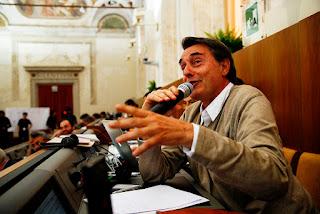In primo luogo abbiamo chiesto come è nata la trasmissione MediaMente: si è trattato di una felice intuizione dell'allora vice-direttore di Video Sapere, poi diventata Rai Educational, Renato Palascandalo. Già verso la fine dell'anno 1994 aveva visto "in mezzo alla nebbia di allora", anticipando la trasformazione dei mezzi di comunicazione che abbiamo visto in questi ultimi anni. Il risultato è stato un vero e proprio servizio pubblico, che raccontava la fondamentale evoluzione del mondo della comunicazione, e le conseguenze nei comportamenti e negli stili di vita delle persone. [video]
 Abbiamo chiesto a Carlo la sua opinione riguardo alle affermazioni del Ministro Severino, secondo la quale Internet dovrebbe essere più regolamentato e controllato. A suo avviso il web di per sé, come tutte le situazioni nate e cresciute libere, non ha bisogno di regole. Esiste un codice penale, e se qualcuno lo infrange è giusto che venga giudicato di conseguenza: il codice è sufficientemente completo e sperimentato per valere anche nel caso di Internet. Purtroppo nella società contemporanea c'è molta voglia di tenere Internet sotto controllo, proprio perché si tratta di uno strumento di libertà. [video]
Abbiamo chiesto a Carlo la sua opinione riguardo alle affermazioni del Ministro Severino, secondo la quale Internet dovrebbe essere più regolamentato e controllato. A suo avviso il web di per sé, come tutte le situazioni nate e cresciute libere, non ha bisogno di regole. Esiste un codice penale, e se qualcuno lo infrange è giusto che venga giudicato di conseguenza: il codice è sufficientemente completo e sperimentato per valere anche nel caso di Internet. Purtroppo nella società contemporanea c'è molta voglia di tenere Internet sotto controllo, proprio perché si tratta di uno strumento di libertà. [video]Abbiamo chiesto se in Italia c'è spazio per programmi di divulgazione tecnologica, ma secondo Carlo questo manca. Guardando i palinsesti risulta abbastanza chiaro che al momento non c'è praticamente nulla in materia, a parte qualche raro programma su satellite. Carlo ha provato a parlare con la Rai per fare un programma del genere, ma non c'è molta attenzione nei confronti dell'informazione scientifica e tecnologica in Italia. [video]
A suo avviso manca la visione, così come è mancata anche ai politici italiani negli ultimi 15 anni, dato che non hanno contribuito, aiutato, facilitato o agevolato la diffusione dell'uso di Internet in Italia, per non parlare della banda larga. Quando manca la visione del futuro, si parla del presente spacciandolo per futuro prossimo, ma una reale visione di cosa succederà tra 5 o 10 anni è totalmente inesistente. [video]
La non adeguatezza dell'approccio di politici e aziende al web ha portato in diversi casi a vere e proprie crisi: secondo Carlo ci troviamo come al solito in mezzo a un guado, una fase di passaggio creata dall'irruzione di un nuovo sistema di comunicazione che ha come diretta conseguenza la disintermediazione e la creazione di un sistema di collegamento diretto tra consumatori e aziende, elettori e politici, produttori e clienti. Abbiamo da una parte un mondo di cui si conoscevano pregi e difetti, e dall'altra un nuovo mondo di cui si intravedono le potenzialità, ma che è ancora in buona parte da esprimere, e l'integrazione è molto difficoltosa. [video]
Un'altra domanda che abbiamo fatto a Carlo riguarda la possibilità di un'integrazione tra TV e nuovi media: secondo Carlo una vera e propria integrazione non è possibile. Certo, un'integrazione superficiale sarebbe fattibile: si possono fare programmi su Internet e in televisione, oppure programmi sul web che abbiano valenza televisiva (seppur limitata), ma una vera integrazione die due sistemi non è possibile perché nascono con caratteristiche diverse, uno come media personale e l'altro come media di massa. Sarebbe come incrociare due cose geneticamente diverse. [video]
In chiusura abbiamo chiesto a Carlo come pensa che evolverà il modo di usare i social media nel caso di rivoluzioni e movimenti sociali, alla luce delle riflessioni sull'unicità della Primavera Araba come fenomeno non più replicabile: secondo Carlo evolverà come l'arte della guerra, tra informazione e controinformazione. Si tratta di dispiegare i mezzi e procedere con la guerriglia tecnologica. [video]
Naturalmente invito tutti a visionare l'intervista integrale, ben più ricca di dettagli di questa mia breve sintesi!
Buona visione!
Maria Petrescu
Intervistato.com | Carlo Massarini
A few weeks ago we had the pleasure of interviewing Carlo Massarini, renown Italian tv journalist: we talked about the origins of the program MediaMente, the future of the integration of old and new media, and the causes of the Italian delay as for the approach of brands and politicians to social networks.
First of all we asked how MediaMente was born: it was a happy intuition of the vice-director of Video Sapere, afterwards Rai Educational, Renato Palascandalo. Towards the end of 1994, he had seen in the "mist" and anticipated the transofrmation of communication means that we have seen during the last few years. The result has been a proper public service, that told the fundamental evolution of the world of communication, and the consequences on behaviors and lifestyles. [video]
We asked Carlo for his opinion about the statements of Minister Severino, who believes the Internet should have more rules and controls. He believes the web per se, as all situations that are born and grown free, doesn't need any rules. There's a penal code, and when somebody breaks it, they should be judged accordingly: the code is sufficiently complete and experimented to be valid for Internet as well. Unfortunatelly in our contemporary society there's a great tendency to keep Internet under control, because it is after all an instrument of freedom. [video]
We asked whether in Italy there is space for technological divulgation programs, but in Carlo's opinion there isn't any. Watching the programs it is clear that at the moment there's nothing about this matter, except for some rare programs on satellite. Carlo has tried to make agreements with Rai to make such a program, but there's a chronic lack of attention towards scientific and technological information in Italy. [video]
He believes that the vision is lacking, as it has been lacking for Italian politicians during the last 15 years, since they haven't contributed, helped nor made it easier to diffuse the use of Internet in Italy, not to speak about broadband. When a vision of the future is lacking, you talk about the present as if it was the near future, but a real vision of what's going to happen in 5 or 10 years in non existent. [video]
The non adequacy of the approach of politicians and brands to the web has brought in several cases to proper crisis: Carlo believes we're in the middle of a swamp, a passage phase created by the irruption of a new communication system that has as a direct consequence the disintermediation and the creation of a direct connection between consumers and brands, voters and politicians, producers and clients. On the one side we have a world of which we knew the good and the bad, on the other a world of which we see the potential, but that still needs to be expressed, and an integration is very difficult. [video]
Another question we asked Carlo regards the possibility of an integration between TV and new media: in Carlo's opinion, a true integration is not even possible. Of course, a superficial one would be doable: you can make programs on the Internet and on TV, or programs on the web that have TV value (even though limited), but a true integration of the two systems isn't possible because they're born with different characteristis, one as a personal media, the other as a mass media. It would be like crossing two things that are genetically different. [video]
Finally we asked Carlo how he thinks that the way to use social media in case of revolutions and social movements will change, in the light of the unicity of the Arab Spring as a non replicable phenomenon: Carlo says that it will evolve like the art of war, between information and counterinformation. It's about spreading the weapons and going forward with a technological guerrilla. [video]
Of course, I invite everyone to view the full interview, much richer in details than my brief synthesis!
Enjoy!
Maria Petrescu






